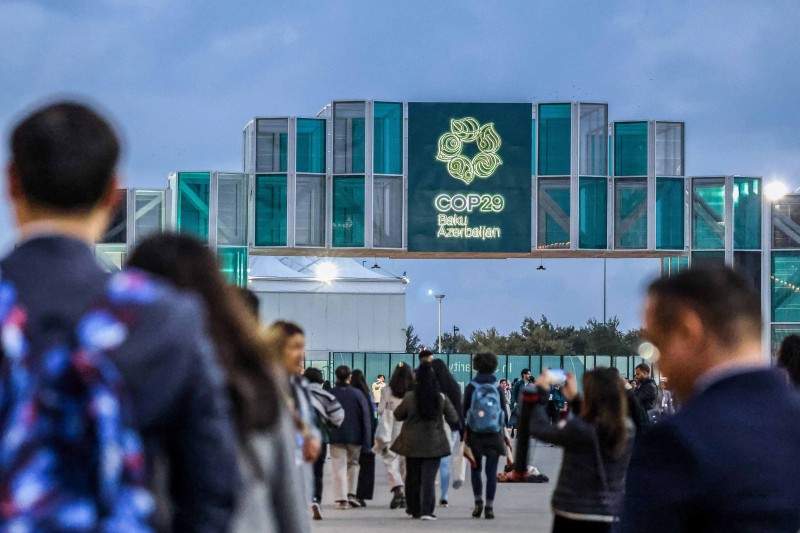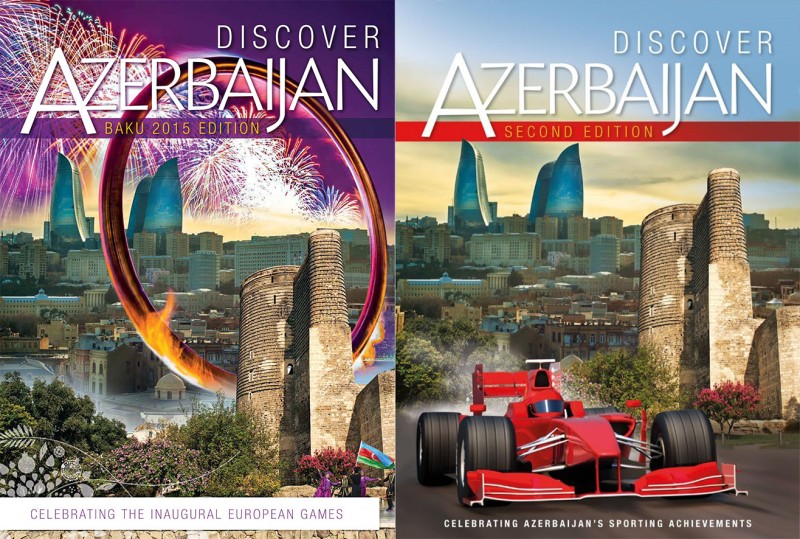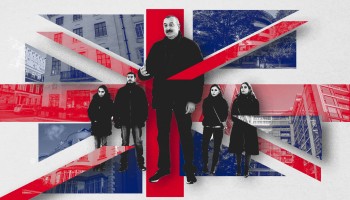Reported by
In March 2022, David Evans, Baron of Watford, stood before British and Azerbaijani dignitaries gathered in a red-carpeted banquet room inside the House of Lords in London and began to recite a poem he had written himself.
“This is a partnership that’s built to last/Throwing off the restraints of your Soviet past,” read one line of the verse, a paean to 30 years of diplomatic relations between the U.K. and Azerbaijan following the fall of the Soviet Union.
Evans’ poem praised the Azerbaijani state oil company’s contracts with British multinational BP, and even Azerbaijan’s victory over Armenia in a six-week war in 2020. He rhymed the territory at the heart of the longstanding conflict — Nagorno-Karabakh — with “thank God we got it back!”
Evans’ support for Azerbaijan’s hosting of U.N. climate talks last month was no less enthusiastic. Earlier this year, the 82-year-old member of the House of Lords — a peer, in British parlance — was quoted by the state news agency Azertac as saying that Azerbaijan deserved to host the COP29 climate conference and would make a great success of it.
He further noted that relations between Azerbaijan and Britain were “improving every day,” Azertac reported.
Lord David Evans of Watford reciting his poem commemorating 30 years of diplomatic ties between the U.K. and Azerbaijan.
Evans is one of several lords across the political spectrum, including Lord Qurban Hussain and Baroness Patricia Scotland, who in recent years have spoken admiringly of oil-rich Azerbaijan, which is nestled between Russia and Iran, despite its checkered human rights and environmental record.
This year, Azerbaijan appears to have used the forum afforded by COP29, which ended in Baku in late November, to curry favor with a larger group of British peers.
In the months leading up to the climate talks, an Azerbaijani lobbying campaign saw two influential members of the House of Lords travel to the country, where they attended an event dedicated to “Azerbaijan’s strategic importance in COP29 and its role in fostering international collaboration.”
Scotland herself also traveled to Baku in May for a similar event, and publicly praised Azerbaijan’s leadership on climate issues. Unlike other hosts of previous COP events, Scotland said in remarks later posted to YouTube by the event’s organizer, Azerbaijan would elevate the voices of smaller countries affected by climate change.
“I have come to understand that Azerbaijan intends to be the voice of those who are not usually heard, the small, the damaged, those who have almost given up hope that anyone is listening,” she said.
“I am unreserved in my applause for what Azerbaijan is trying to do,” she added.
Patricia Scotland after being appointed secretary-general of the Commonwealth of Nations in 2015.
There is no evidence that Azerbaijan’s successful efforts to build relationships with figures like Scotland and Evans break parliamentary rules. But human rights watchdogs warn that lords’ gushing support for Baku risks legitimizing an authoritarian state whose electoral system and military operations warrant close scrutiny, if not condemnation.
Scotland in particular is a prominent figure in the U.K. since, in addition to being a member of the House of Lords, she is the secretary-general of the Commonwealth, a group of 56 countries comprising many of Britain’s former colonial possessions.
“Azerbaijan trie[d] to influence politicians and other influential figures ahead of COP because they wanted to make sure that there is high-level presence, that they have a good show, and that they achieve some deals,” said Sonja Schiffers, director of the South Caucasus office of the Heinrich Böll Foundation, a German think tank.
But even when Western politicians have “good intentions,” Schiffers said, it can be difficult to remain “independent and critical” when being hosted by an authoritarian regime. “We need to stop being naive,” she said.
Peers Invited to Baku
Scotland attended the May event in Baku at the invitation of the Tahir Gözel Initiative for Development, a newly created non-profit organization set up by Azerbaijani businessman Tahir Gözel.
There she gave a lecture to students about the “significance of COP29 and the role of Azerbaijan.”
Scotland urged her audience of young Azerbaijanis to support their government, which the human rights group Freedom House ranks as one of the most authoritarian in the world. “What your government is trying to do here at COP really matters, and you need to be proud of them, you need to be supporting,” she said.
Baroness Patricia Scotland meets with Azerbaijani President Ilham Aliyev on November 18, 2024.
Her visit coincided with the 101st anniversary of the birth of Azerbaijan’s Soviet-era and post-independence leader Heydar Aliyev, who was elected after a 1993 military coup and ruled the country until his death in 2003, when his son Ilham took over the presidency. Accompanied by Gözel, Scotland laid flowers at Aliyev’s grave, where a wreath bearing her name had also been placed.
At the same event attended by Scotland, Gözel declared that his organization aims to “promote” Azerbaijan’s role in the world. The Initiative's website, created earlier this year, describes Gözel as “a thinker and a philosopher” dedicated to ecology and the fight against climate change, and lists Azerbaijan’s transport and ecology ministries as partners. The website also states that the Initiative is a COP29 partner, though it does not explain its role in the event.
Gözel himself is the son of the founder of major Azerbaijani conglomerate Azersun, an official COP29 partner. He also sits on the supervisory board of SOCAR Energy Georgia, a subsidiary of Azerbaijan’s state oil firm involved in the distribution of oil and gas in neighboring Georgia.
A Commonwealth spokesperson told OCCRP that Scotland has worked closely with every COP presidency since 2017 to “support climate action and to promote the interests of the Commonwealth’s member countries.”

Participants at the start of COP29 on November 11, 2024.
In October, Gözel’s Initiative paid for two other members of the House of Lords, Iain McNicol and Darren Mott, to travel to Baku for three days to meet with COP29 officials and “other national organizations,” according to British parliamentary transparency records.
There they attended an event dedicated to “Azerbaijan’s Strategic Importance in COP29 and its Role in Fostering International Collaboration.”
Gözel also accompanied the peers to Heydar Aliyev’s grave. Azerbaijani media published a photo of a wreath laid at the memorial bearing Gözel, Mott, and McNicol’s names.
Both lords are influential in their respective political parties. From 2011 to 2018, McNicol was general secretary of the Labour Party, which is now in government. Mott, who became a lord last year, was CEO of the Conservative Party from 2020 to 2022, when it was in power.
Neither parliamentarian answered OCCRP’s questions about the visit.
Gözel appears to have ambitions to continue forging ties with British politicians. At a meeting with the U.K.’s ambassador to Azerbaijan in August, he said he wanted to sponsor a “U.K. Parliament All-Party Azerbaijan Friendship Group” to “promote a deeper understanding and recognition of Azerbaijan’s contributions to the world.”
In response to questions from OCCRP on its activities, the Gözel Initiative’s chief operating officer, Fatima Mammadova, wrote that the organization had “lawfully and transparently” brought U.K. parliamentarians to COP-related events, and did not ask them to lobby on anyone’s behalf.
Mammadova added that, in recent years, Tahir Gözel’s business interests had “moved away” from oil and gas into “sustainable and environmentally responsible” investments, including in agricultural technology.
According to Schiffers, Azerbaijan’s forceful resolution of the Karabakh conflict and crackdown on internal dissent has given it “confidence” that it will not face “serious sanctions” from the West. She added that “it’s still important for Azerbaijan to have [a] reputation as a reliable partner” for investment in fossil fuels and renewables projects.
Glossy Books Praising Baku
Evans, the lord who wrote the poem praising Azerbaijan, has also advocated for the country in his capacity as a private book publisher.
The Azerbaijani state oil company SOCAR contracted Senate Publishing, the company Evans co-founded and chairs, to produce three glossy books about Azerbaijan between 2015 and 2019.
The first was a celebration of the 2015 European Games, hosted in Azerbaijan amid calls from international organizations to cease a violent crackdown on human rights defenders.
In a contribution to the book, SOCAR’s then-president lauded Azerbaijan’s stewardship of its natural resources and “good use of its oil wealth,” in contrast to countries where “windfall riches are hoarded by one section of society at the expense of the rest.” (Azerbaijan has itself faced similar accusations.)

Two of the books on Azerbaijan published by Lord David Evans' publishing company, Senate Publishing.
Two of the books on Azerbaijan published by Lord David Evans' publishing company, Senate Publishing.
The book launch, held at Baku’s Four Seasons Hotel, was attended by several British parliamentarians, including Patricia Scotland, who represented the publishing company at the event, according to a press release. (SOCAR paid for some of the parliamentarians to attend the event, but not for Scotland’s trip, according to parliamentary transparency records.)
A Commonwealth spokesperson said Scotland had no financial interest in Senate Publishing and had attended the book event while in Baku as part of a parliamentary delegation. At the time, Scotland had not yet been appointed to lead the Commonwealth.
Though Evans has for years declared his chairmanship of Senate Publishing to the British parliament, the peer has never formally disclosed that SOCAR was a client of the firm. Until 2021, the House of Lords did not require its members to disclose foreign state-owned clients of companies they hold directorships in. They must now do so if they personally provide services to such clients.
“It is Senate Publishing that has contractual business relations with SOCAR — not me,” Evans told OCCRP. “There was nothing to disclose.”
He confirmed that Senate published “a number of foreign direct investment type books for SOCAR over the years, on a normal commercial basis,” but declined to comment on the compensation arrangements, which he said were confidential.
“When [public representatives] become entrenched or embedded in these relationships with transnational corporations or representatives of foreign governments they become vulnerable to interests that may not be in the interests of those who they are supposed to be representing,” said Kate Watters, co-founder of Crude Accountability, a U.S.-based human rights and environmental watchdog for the Caspian Sea region.
Evans declined to comment on Watters’ statement. He referred to all criticism of him contained in this article as “baseless” and noted that he has done extensive pro-bono work for groups benefiting cancer research and small businesses.
In 2022, Evans announced to his LinkedIn followers that a fourth “prestigious book” on Azerbaijan was in the works. He said it would seek to “promote investment opportunities in the Karabakh region.” But the parliamentarian told OCCRP that the project had been canceled. He did not explain why.
An election official helps a voter at a polling station during Azerbaijan’s early parliamentary elections in Baku on September 1, 2024.
Claims of Electoral Whitewashing
Two members of the House of Lords have traveled to Azerbaijan, at the government's expense, to monitor its elections, which independent observers say are not free.
Evans’ son, 25, also has ties to the Azerbaijani state oil company. His LinkedIn page lists an internship at SOCAR Trading, the Geneva-based marketing arm of SOCAR, from January to March 2023. During that internship, Evans’ son was also working as a researcher for his father in the House of Lords, according to his LinkedIn page and parliamentary staff registers that OCCRP obtained through freedom-of-information requests.
The peer said that SOCAR Trading paid his son the “basic Swiss ‘intern’ rate,” and did not cover his living expenses in Geneva.
SOCAR Trading told OCCRP that it took Evans’ son on as a paid intern after he “expressed an interest” in gaining work experience there.
“Our Compliance team were made aware of his application, and assessed the matter for potential conflict of interest in line with company policy, concluding his candidacy acceptable,” SOCAR Trading said.
The firm added that the decision was based on factors including the young man’s strong resume, the firm’s limited exposure to the U.K., and the fact that Evans’ political party was in opposition at the time.
Landmine Maps… and Close Friendships
Three lords — David Evans, Qurban Hussain and John Taylor – share such an interest in Azerbaijan that they have asked virtually identical questions about the Nagorno-Karabakh conflict in parliament.
Taylor, who is not affiliated with a political party, declared five free trips to Azerbaijan in the House of Lords’ register of interests between 2011 and 2021. The first four were paid for by a now-defunct lobby group, the European Azerbaijan Society, and the most recent one by the Azerbaijani government.
The three peers all urged the British government to ask Armenia to inform Azerbaijan of the location of landmines in the conflict areas, in order to support Baku’s demining efforts — Taylor in June 2021, Hussain in November 2021, and Evans in October of the following year.
That question was one of only two spoken contributions Evans has made in parliament since 2010. He told OCCRP he was a strong supporter of peace in the region.
The issue of Nagorno-Karabakh landmine maps is contentious. In 2021, Azerbaijan released 15 Armenian prisoners of war in exchange for maps showing the location of close to 100,000 mines. Armenia has since released more maps, which Azerbaijan called “unreliable and incomplete.”
Taylor did not respond to a request for comment. A spokesperson for Hussain said that he had "long been passionate about the need to remove landmines from conflict areas.”
David Evans and Qurban Hussain at Azerbaijan’s Official Banquet in London, held to celebrate Azerbaijan's Independence.
Evans and Hussain have crossed paths outside Parliament as a result of their common interest in Azerbaijan. In May 2022, the two men attended an Azerbaijan-hosted function at Lancaster House, a former royal residence in London now managed by the U.K.’s Foreign Office, to celebrate the country’s day of independence. They were pictured alongside Azerbaijan’s ambassador to the U.K. as he cut a cake displaying the country’s flag.
Evans later wrote about the event on LinkedIn: “My work with SOCAR, the Azerbaijan State Oil Company and Government stems back 15 incredible and enjoyable years.” He added that he highly valued his “very close friendships” with Azerbaijani diplomats and “my SOCAR ‘family’.”










